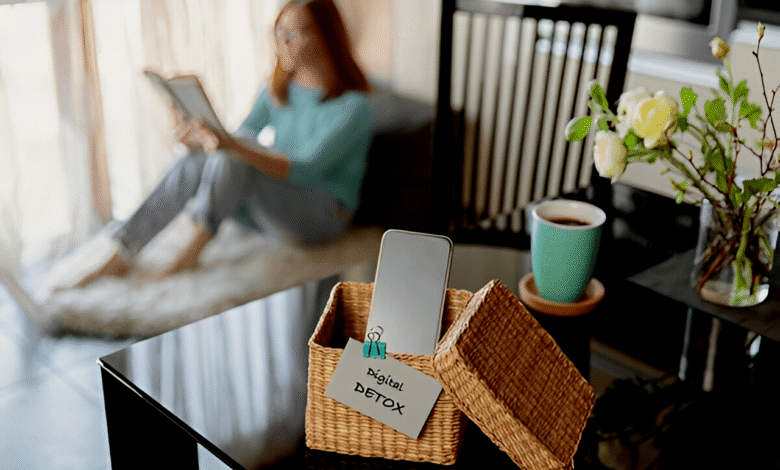Digital Detox Why UK Students Should Unplug More Often
Digital detox Discover why UK students need regular screen breaks to boost focus mental health and academic performance Unplug to recharge.

In today’s hyper-connected world, digital detox has become an essential practice for maintaining mental well-being, particularly among UK students. With smartphones, social media, and constant online learning dominating daily life, young people are spending more time glued to screens than ever before. While technology offers undeniable benefits for education and communication, excessive screen time has been linked to increased stress, sleep disturbances, and declining concentration. This article explores why stepping away from digital devices is crucial for students’ academic performance, mental health, and overall quality of life.
The concept of a digital detox consciously reducing screen time to reconnect with the offline world is gaining traction as educators and health professionals recognize its importance. For UK students, who face immense academic pressure alongside social media’s constant demands, unplugging can provide much-needed relief. By examining the psychological and physical effects of digital overload, as well as practical strategies for disconnecting, this discussion aims to empower students to take control of their technology use rather than being controlled by it. The benefits extend beyond better focus and productivity, offering improved sleep, stronger real-world relationships, and a healthier approach to the digital landscape that will shape their future.
Digital Detox Why UK Students Should Unplug More Often
The Digital Dilemma Facing UK Students
Today’s students are caught in a paradox of connectivity – while digital tools are essential for education and socialization, their overuse creates significant problems. The average UK student now spends 8-10 hours daily staring at screens, a habit linked to rising cases of digital eye strain, sleep disorders from blue light exposure, and decreased attention spans. This constant engagement creates a cycle where students feel compelled to remain online for fear of missing academic updates or social interactions, yet simultaneously experience burnout from the never-ending stream of notifications and information. The pressure to be perpetually available has transformed smartphones from useful tools into sources of stress and distraction.
The Transformative Power of Unplugging
Intentional disconnection offers students an opportunity to reset their relationship with technology. Research shows that even short digital breaks can significantly improve memory retention, with students who practice regular tech-free periods demonstrating 20-30% better recall in studies. Beyond academics, unplugging allows for proper rest – the National Sleep Foundation reports that avoiding screens before bed can improve sleep quality by up to 50%. Perhaps most importantly, digital detoxes create space for genuine human connection and self-reflection, combating the loneliness epidemic exacerbated by superficial social media interactions.
The Rise of Digital Dependency Among UK Students
The average UK student spends between 6 to 9 hours daily on digital devices, a figure that includes online classes, social media browsing, gaming, and streaming. While some of this usage is academically necessary, a considerable portion is spent on passive consumption, such as endless scrolling or binge-watching. Studies indicate that prolonged screen exposure contributes to digital eye strain, disrupted sleep patterns due to blue light emission, and heightened stress levels. Additionally, the constant influx of notifications fosters a compulsive need to check devices, reducing attention spans and productivity.
Mental Health Implications of Excessive Screen Time
One of the most pressing concerns surrounding digital overuse is its impact on mental health. Research from UK universities highlights a correlation between high social media consumption and increased anxiety and depression among students. Platforms like Instagram and TikTok often promote unrealistic comparisons, leading to low self-esteem and feelings of inadequacy. Furthermore, the pressure to remain perpetually online can result in digital fatigue, a state of mental exhaustion caused by information overload. Regular digital detoxes allow students to step back, recharge, and regain emotional balance.
Academic Performance and Focus
While technology facilitates learning, it can also be a major distraction. Multitasking between study materials, messaging apps, and entertainment sites fragments concentration, making it harder to retain information. Studies show that students who take intentional breaks from screens perform better in exams and coursework. A digital detox helps reset cognitive functions, improving memory retention and critical thinking. By minimizing unnecessary screen time, students can allocate more energy to deep, uninterrupted study sessions.
The Benefits of Unplugging
Disconnecting from digital devices, even briefly, offers numerous advantages. Improved sleep quality is one of the most immediate benefits, as reduced blue light exposure helps regulate melatonin production. Face-to-face interactions also become more meaningful when students are fully present, strengthening friendships and reducing loneliness. Additionally, unplugging encourages engagement in offline hobbies such as reading, sports, or creative arts which foster personal growth and relaxation.
Practical Strategies for a Successful Digital Detox
Setting Boundaries with Technology
Establishing clear limits is fundamental to a successful digital detox. Students should begin by setting daily screen time limits on their devices, using built-in features like iOS’s Screen Time or Android’s Digital Wellbeing tools to track and restrict usage. Designating tech-free zones, particularly in bedrooms and dining areas, creates physical spaces for relaxation and face-to-face interaction without digital interruptions. These boundaries help retrain the brain to view technology as a tool rather than a constant companion, making it easier to disengage during essential downtime.
Cultivating Offline Alternatives
Replacing screen time with fulfilling activities is key to sustaining a digital detox. Students should proactively schedule offline pursuits like nature walks, meditation sessions, or creative journaling activities that provide mental refreshment without digital stimulation. Additionally, turning off non-essential notifications reduces the urge to constantly check devices, while the Pomodoro Technique (25-minute focused study sessions followed by 5-minute screen-free breaks) can prevent burnout during academic work. By consciously filling their time with rewarding analog experiences, students naturally decrease reliance on digital entertainment and build healthier daily rhythms.
Read More: Healthy Eating Habits for Busy Learners in the UK
Conclusion
A digital detox offers UK students a powerful antidote to the stress and distraction of constant connectivity. By consciously unplugging from devices, students can reclaim their focus, improve sleep quality, and nurture more meaningful offline relationships. The benefits extend beyond academic performance to include enhanced mental wellbeing and a healthier perspective on technology use. While digital tools remain essential for modern education, learning to use them mindfully rather than compulsively is the key to maintaining balance in an increasingly wired world.
Embracing regular digital detoxes doesn’t mean rejecting technology altogether but rather developing a more intentional relationship with digital devices. For UK students navigating the pressures of studies and social life, scheduled screen breaks can become a form of self-care that boosts both productivity and personal happiness. As educational institutions and mental health experts increasingly recognize the value of unplugging, students who adopt this practice now will be better equipped to handle the digital demands of both university life and their future careers. The path to digital wellbeing begins with small, consistent steps away from the screen and back into the richness of real-world experience.
FAQs
What is a digital detox?
A digital detox involves taking intentional breaks from electronic devices to reduce stress and improve mental well-being.
How can UK students benefit from a digital detox?
Unplugging helps enhance focus, reduce anxiety, improve sleep, and strengthen real-life social connections.
How long should a digital detox last?
Even short breaks (a few hours daily or a weekend) can be beneficial, but longer detoxes (a week or more) yield deeper results.
Can students still study effectively during a digital detox?
Yes, by using offline resources like books and handwritten notes while limiting non-essential screen time.
What are some easy ways to start a digital detox?
Begin by disabling notifications, setting screen time limits, and dedicating specific hours to offline activities.







